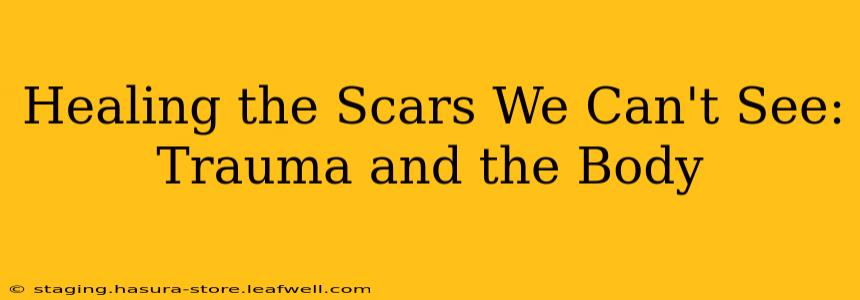Trauma isn't just a mental health issue; it profoundly impacts the body. While visible wounds heal, the unseen scars of trauma can linger, manifesting in physical symptoms and persistent discomfort. Understanding this mind-body connection is crucial for effective healing. This article explores the intricate relationship between trauma and the body, offering insights into how trauma manifests physically and providing pathways towards healing.
What are the Physical Manifestations of Trauma?
Trauma's physical effects are diverse and can vary greatly depending on the individual and the nature of the trauma. Many people experience chronic pain, headaches, digestive issues, and sleep disturbances. These symptoms are often dismissed as psychosomatic, but they are very real and stem from the body's physiological response to trauma. The nervous system, in particular, plays a critical role. The fight-or-flight response, while essential for survival in immediate danger, becomes problematic when chronically activated due to unresolved trauma. This constant state of hyper-arousal can lead to a range of physical ailments.
How Does Trauma Affect the Nervous System?
The nervous system's role in trauma is paramount. When experiencing trauma, the body releases stress hormones like cortisol and adrenaline. These hormones prepare the body for action, but prolonged exposure leads to dysregulation of the nervous system. This dysregulation can manifest as:
- Chronic pain: Trauma can sensitize the nervous system, leading to increased pain perception, even in the absence of physical injury.
- Gastrointestinal problems: The gut-brain connection is strong; trauma can disrupt digestion through altered gut motility and increased inflammation.
- Cardiovascular issues: Chronic stress from trauma can elevate blood pressure and increase the risk of heart disease.
- Sleep disturbances: Trauma often leads to insomnia, nightmares, and other sleep disorders due to heightened anxiety and arousal.
Can Trauma Manifest as Physical Illness?
Yes, absolutely. The long-term effects of trauma can significantly increase the risk of developing various physical illnesses. This is because chronic stress weakens the immune system, making individuals more susceptible to infections and diseases. Research increasingly links unresolved trauma to conditions like autoimmune disorders, fibromyalgia, and irritable bowel syndrome (IBS). It's vital to consider trauma as a potential underlying factor when addressing persistent physical health issues.
What are the Different Types of Body-Oriented Therapies for Trauma?
Fortunately, many therapeutic approaches focus on addressing the body's experience of trauma. These therapies aim to help individuals regulate their nervous system and release stored tension within the body. Examples include:
- Somatic Experiencing (SE): This approach helps individuals gently process traumatic memories and release the physical sensations associated with them.
- Sensorimotor Psychotherapy: This therapy integrates mindfulness and body awareness techniques to help individuals regulate their nervous system and manage overwhelming emotions.
- Yoga and Tai Chi: These practices promote relaxation, reduce stress, and improve body awareness, facilitating healing.
How Can I Find a Therapist Who Specializes in Trauma?
Finding a qualified therapist specializing in trauma is crucial for effective healing. You can start by searching online directories of therapists in your area. Look for therapists who explicitly mention experience with trauma-informed care and specific trauma therapies like those listed above. It's also important to find a therapist with whom you feel safe and comfortable sharing your experiences.
What are the Long-Term Effects of Untreated Trauma?
Untreated trauma can have profound and long-lasting effects on both physical and mental health. It can contribute to chronic pain, mental health disorders, relationship difficulties, and decreased overall quality of life. Seeking professional help is essential to address the underlying causes of trauma and prevent these long-term consequences.
Conclusion
The impact of trauma extends far beyond the mind; it profoundly affects the body. By recognizing the mind-body connection in trauma and exploring appropriate therapeutic approaches, individuals can begin the journey toward healing the unseen scars and reclaiming their physical and mental well-being. Remember, healing is possible, and seeking support is a sign of strength.

